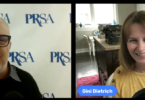PRSA has released a comprehensive framework titled “Promise and Pitfalls: The Ethical Use of AI for Public Relations Practitioners.”
This guidance (which you can find here) aligns with PRSA’s Code of Ethics and offers best practices to prevent and manage ethical challenges arising from the improper use of AI tools. The report, authored by PRSA’s Board of Ethics and Professional Standards (BEPS), results from extensive research, expert input and peer review.
Ahead of its release, 2023 Chair Michelle Egan, APR, Fellow PRSA, emphasized PRSA’s commitment to ethical behavior since the organization’s establishment in 1947 and the creation of its Code of Ethics in 1950. She highlighted the significance of AI in the profession and how “Promise and Pitfalls” contributes to the ongoing discussion on AI’s ethical use in public relations.
“This shows that our Code of Ethics has really stood the test of time,” Egan told PRsay. “Taking a decades-old Code and applying it to emerging scenarios is a testament to its enduring relevance and adaptability.”
AI has been a top-of-mind topic for Egan this year, and she has seen an increased interest from the PRSA members and communicators she has met during 2023.
“Throughout the year, I’ve noticed a significant shift in our members’ awareness and comfort with large language models. Initially, many were unfamiliar, and there was a sense of hesitation, even fear, with some considering it akin to cheating. However, as the months passed, I’ve seen a growing number of hands raised when I ask about experiences with models like ChatGPT,” Egan said. “The initial concerns have evolved into a more positive and exploratory attitude.
“Attending various conferences and events, I’ve witnessed AI becoming a more integral part of our programming. From the outset, we anticipated our members would seek guidance in this evolving landscape,” Egan continued.
Mark Dvorak, APR, Fellow PRSA, the 2023 BEPS chair, pointed out the urgency of understanding the operation of AI tools, especially with the rise in the popularity of generative models like ChatGPT. Without this knowledge, PR practitioners risk neglecting the essential human element these tools are meant to serve.
The report focuses on five provisions from PRSA’s Code of Ethics: Free Flow of Information, Competition, Disclosure of Information, Safeguarding Confidences and Enhancing the Profession. Each provision is defined and examined in the context of generative AI tools, accompanied by examples of both improper and proper use.
The report concludes with a Cost/Benefit Analysis for the Use of Generative AI Tools. It complements existing resources on PRSA’s AI Insights page, such as Strategies & Tactics articles, webinars, best practices, and blog posts.
“I commend BEPS for their thoughtful approach in examining our Code and providing guidance that explores possibilities and highlights considerations,” Egan said. “It’s crucial for us to progress in our profession by understanding and appropriately incorporating these tools into our work.”
[Illustration credit: VRVIRUS]







